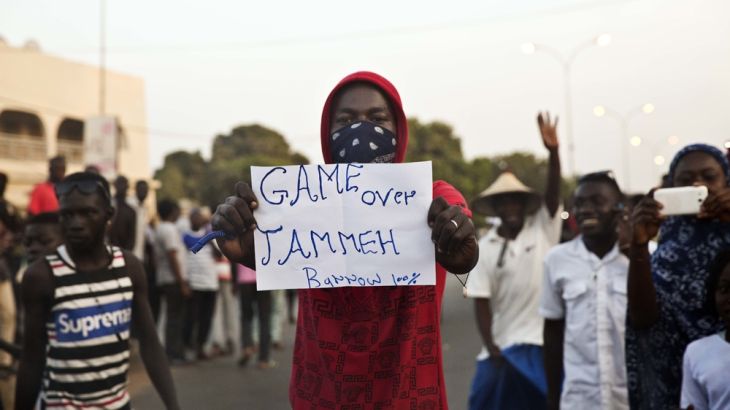
Gambia: The people who stood up to Yahya Jammeh
We talk to the men and women who helped bring Yahya Jammeh’s 22-year rule to an end.
On January 21 2017, Yahya Jammeh boarded a plane at Banjul’s international airport and left the country he had ruled for 22 years.
Jammeh had refused to accept defeat in the Gambian presidential elections the month before. West African heads of state set off on a month-long marathon negotiation, taking turns to get Jammeh to accept the results. Eventually, they gave him an ultimatum: step down or 7,000 soldiers from the region step in to take back control of the country.
On January 19, foreign troops marched in as the country’s elected leader, Adama Barrow, was sworn in.
Jammeh took power in a bloodless coup in 1994, when he was a 29-year-old lieutenant.
“We have no plans to stay long. What we are here for is to set a just system and to put up structures so that what happened in the past 13 years will never happen again,” he said at the time.
But soon, Jammeh had swapped his army uniform for a white traditional robe and adopted a more authoritarian tone.
He ruled the country with an iron fist – imprisoning critics and political opponents. Human rights organisations accused him and his security forces of torture and enforced disappearances.
In April 2016, members of the opposition held a small peaceful march calling for electoral reforms ahead of the December presidential elections. Among the protesters was Fatoumata Sandeng’s father.
“He was taken to the NIA headquarters in Banjul, the secret police who worked with Jammeh to spy on people,” Sandeng told Al Jazeera. There, he was interrogated and tortured to death.
Challenging the security forces and her father’s killer, Sandeng took to the streets in protest. It caught the attention of the security forces, and she had to flee to Senegal.
“I got to a point where I cared no more. From [the day of his death] I wanted to be my father … He wanted a better future for me and the rest of my family, for the rest of the Gambians. So who would I be if I were to keep quiet? I felt this was the only thing I had left to do for my father now. I had to speak up for him,” she says.
|
|
Jammeh believes he has magical powers and can cure people from HIV and Aids. He created a treatment centre inside the state house and showed Al Jazeera the treatment – a mixture of prayers and concoctions he prepared personally.
Fatou Jatta contracted the virus in 1999. She joined a HIV prevention support group, becoming a vocal advocate. Jatta encouraged people to get medical help, but in 2007, Jammeh announced he had found a cure for the virus.
He selected Jatta and other members of the support group for treatment.
“We could not say no,” she told Al Jazeera. “It was very terrible … The very first day I took the medication, I went weak, had nausea … a loss of appetite.”
Jatta had to drink potions prepared by Jammeh which she says made her start vomiting on sight. And, of course, Jammeh’s treatment had no effect.
“It was a trial. He was just doing a trial to see whether it would work or not. But for me, it didn’t. After that, I had to go back to the hospital … my immune system was weak, my CD4 [white blood cells that fight infections] count had dropped. For me, it didn’t work,” Jatta said.
Fear of Jammeh ran deep, until Adama Barrow’s presidential campaign.
I stood up against them, I could have lost my life.
Thousands took to the streets, calling for an end to Jammeh’s regime. Young Gambians, normally apathetic about politics, came out to vote in large numbers.
As polls closed, the chairman of the electoral commission, Alieu Njie, saw the numbers rolling in. He was responsible for the final official tally.
At noon on December 1, Njie announced that Yahya Jammeh had lost the elections, stunning Gambians.
“I was just transmitting the will of the people. He never thought that he would lose the election,” Njie told Al Jazeera.
“It was very difficult,” Njie says of standing up to Jammeh. “There were moves to get me to change the results.”
While Njie would not go into how people tried to make him change the election result, he said: “They were here … I stood up against them, I could have lost my life. I stood up.”
Since his fall from power, political prisoners have been freed and the horrors of Jammeh’s rule are being revealed, but Gambia is a nation still reeling from 22 years of one man’s rule.